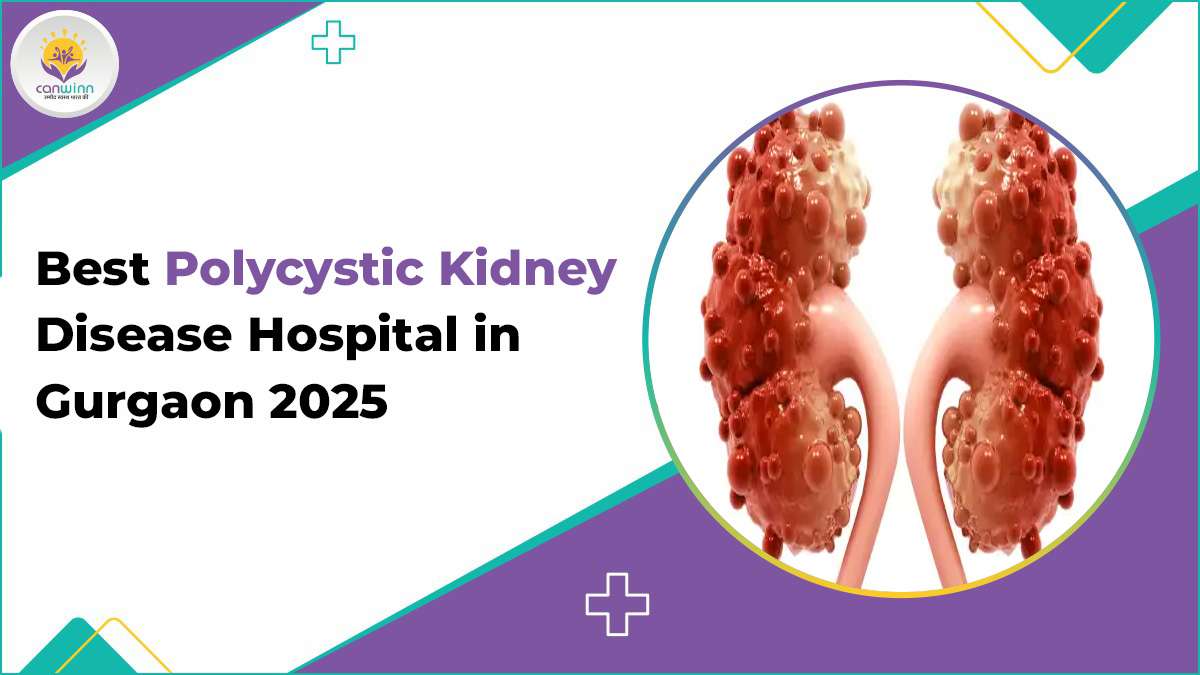Choosing the right hospital for Polycystic Kidney Disease (PKD) treatment is crucial for effective management and long-term kidney health. In a city like Gurgaon, where numerous healthcare options are available, it can be difficult to find a hospital that offers both advanced medical expertise and compassionate care.
CanWinn Foundation has emerged as a trusted name in kidney care, recognized as one of the best hospitals for Polycystic Kidney Disease treatment in Gurgaon. With a team of highly skilled Polycystic Kidney Disease, modern diagnostic facilities, and personalized treatment plans, CanWinn Foundation ensures comprehensive care for every patient. From early detection and genetic counseling to specialized treatments, lifestyle management, and advanced therapies, our experts are committed to improving the quality of life for PKD patients. With a strong focus on patient well-being, we provide holistic care that combines medical excellence with empathy.
How to Choose the Right Polycystic Kidney Disease Hospital
Selecting the right hospital for Polycystic Kidney Disease (PKD) treatment is crucial for effective management and long-term well-being. Since PKD is a progressive and complex kidney disorder, it requires specialized care, advanced facilities, and a multidisciplinary approach. Here are the key factors to consider when choosing the best hospital for PKD:
- EExpertise in Polycystic Kidney Disease: PKD demands the attention of highly skilled Polycystic Kidney Disease who have in-depth knowledge of genetic kidney disorders. A hospital with experienced kidney specialists ensures accurate diagnosis, early detection of complications, and timely treatment interventions.
- Personalized Treatment Plans: Every PKD patient experiences the condition differently, from varying rates of cyst growth to complications like high blood pressure or kidney failure. Leading hospitals create individualized care plans tailored to each patient’s needs, improving treatment effectiveness and quality of life.
- Comprehensive Multidisciplinary Care: PKD often affects more than just the kidneys—it can lead to liver cysts, heart issues, or metabolic complications. The right hospital provides access to a team of specialists including cardiologists, hepatologists, endocrinologists, and dietitians, ensuring holistic care for better overall health outcomes.
- Access to Advanced Treatments and Technology: From genetic testing and advanced imaging to modern dialysis and kidney transplantation programs, a top PKD hospital stays updated with the latest medical innovations. Cutting-edge facilities give patients more effective and less invasive treatment options.
- Support Beyond Medical Care: Living with PKD can be emotionally and physically challenging. The best hospitals offer not only expert medical care but also patient education, lifestyle guidance, and emotional support programs to help patients and families confidently manage the condition.
Selection Criteria for Polycystic Kidney Disease Hospitals
Choosing the right hospital for Polycystic Kidney Disease (PKD) is a critical decision that can directly influence patient outcomes, quality of care, and overall well-being. Since PKD is a progressive condition that requires long-term monitoring and treatment, it is important to evaluate hospitals carefully before making a choice. Below are the key selection criteria to consider when choosing a hospital for PKD care.
1. Expertise and Experience of Polycystic Kidney Disease
The foundation of effective PKD treatment lies in the expertise of the hospital’s Polycystic Kidney Disease team. A hospital should have highly qualified Polycystic Kidney Disease with proven experience in diagnosing and managing complex kidney disorders. Look for doctors with advanced training, certifications from recognized institutions, and a strong track record in treating PKD and related kidney conditions.
2. Advanced Diagnostic and Treatment Facilities
Early and accurate diagnosis is essential in PKD management. Hospitals should be equipped with modern technology and diagnostic tools, including:
- Ultrasound and Imaging for kidney size assessment and cyst detection.
- Blood and Urine Tests to evaluate kidney function.
- Renal Biopsy for accurate diagnosis of underlying kidney issues.
- Dialysis Centers offering both hemodialysis and peritoneal dialysis with up-to-date systems.
3. Kidney Transplant Capabilities
For advanced PKD cases progressing to end-stage renal disease (ESRD), access to kidney transplant services is vital. A reliable hospital should have:
- A dedicated transplant unit.
- Experienced surgeons with strong success rates.
- Comprehensive post-transplant care.
- Ethical organ donation and transplant protocols.
4. Multidisciplinary and Comprehensive Care
Since PKD often leads to complications such as hypertension, diabetes, and cardiovascular issues, hospitals offering multidisciplinary care provide better outcomes. A strong PKD hospital should include services from Polycystic Kidney Disease, urology, cardiology, endocrinology, and nutrition experts. Additional support such as:
- Dietary counseling for kidney health.
- Lifestyle modification programs for blood pressure and diabetes management.
- Psychological support for patients undergoing long-term treatment.
5. Emergency and ICU Support
PKD complications like acute kidney failure may require immediate care. Hospitals should have a 24/7 emergency department and a well-equipped Intensive Care Unit (ICU) capable of handling critical kidney-related emergencies and post-transplant complications.
6. Patient Reviews and Treatment Outcomes
Researching hospital reviews, patient testimonials, and treatment success rates can provide valuable insights. A hospital with high patient satisfaction, transparency, and consistent positive outcomes is more likely to deliver dependable care.
7. Cost Transparency and Insurance Coverage
Treatment for PKD—including dialysis and transplants—can be financially demanding. Prefer hospitals that:
- Accept a wide range of insurance providers.
- Offer financial counseling or assistance programs.
- Provide clear and transparent billing systems.
8. Accessibility and Convenience
For patients requiring frequent dialysis or regular follow-ups, hospital location matters. Select a hospital that is easily accessible from home, with good transportation links, to reduce travel burden during long-term treatment.
A Polycystic Kidney Disease Doctor’s Qualifications and Expertise
Polycystic Kidney Disease (PKD) is a complex condition that requires specialized medical expertise for effective diagnosis and management. A Polycystic Kidney Disease doctor, often a nephrologist with advanced training, plays a critical role in caring for patients with PKD and other kidney-related disorders. Understanding their qualifications and expertise helps patients make informed decisions and ensures they receive the highest quality of care.
Educational Qualifications of a Polycystic Kidney Disease Doctor
- Bachelor’s Degree: The journey begins with an undergraduate degree in science-related fields such as biology, chemistry, or pre-medical studies
- Medical Degree (MBBS/MD): After graduation, they must complete a medical degree such as Doctor of Medicine (MD) or MBBS.
- Residency in Internal Medicine: A three-year residency in internal medicine follows, providing a strong foundation in diagnosing and managing a broad range of medical conditions.
- Fellowship in Polycystic Kidney Disease: To specialize in kidney care, doctors undergo a two to three-year fellowship in Polycystic Kidney Disease, focusing on kidney diseases, dialysis, hypertension, and kidney transplantation.
- Board Certification: Many PKD doctors pursue board certification in internal medicine and Polycystic Kidney Disease to validate their expertise and commitment to excellence.
Core Expertise of a Polycystic Kidney Disease Doctor
- Chronic Kidney Disease (CKD) Management: Early diagnosis and interventions to slow disease progression.
- Acute Kidney Injury (AKI): Prompt management of sudden kidney failure caused by infections, dehydration, or medications.
- Hypertension Control: Specialized treatment for high blood pressure, a key contributor to kidney damage.
- Dialysis Care: Expertise in managing dialysis for patients with end-stage renal disease (ESRD).
- Electrolyte & Fluid Balance: Treating imbalances in sodium, potassium, and calcium linked to kidney dysfunction.
- Comprehensive PKD Care: Tailored treatment plans for managing cyst growth, preserving kidney function, and improving quality of life.
A Collaborative and Patient-Centered Approach: At CanWinn Foundation, Polycystic Kidney Disease doctors work within a multidisciplinary team that includes dietitians, urologists, and transplant surgeons. This collaborative approach ensures holistic, personalized treatment for every patient.
Beyond medical expertise, our doctors emphasize compassionate care, recognizing the emotional and lifestyle challenges faced by kidney disease patients. Through patient education and support, individuals are empowered to actively participate in their treatment and make healthier choices for long-term well-being.
Commitment to Research and Innovation: CanWinn Foundation remains at the forefront of Polycystic Kidney Disease by integrating cutting-edge research, clinical trials, and advanced therapies into patient care. Our commitment to innovation enables us to offer the latest treatment options and customized care strategies for PKD patients.
Compassionate Patient-Centered Care: Beyond medical expertise, we emphasize compassionate care, acknowledging the emotional and practical challenges faced by kidney disease patients. Our team focuses on patient education, empowering individuals to take an active role in their treatment and lifestyle management, ensuring better long-term health outcomes.
How to Choose a Polycystic Kidney Disease Hospital
Choosing the right hospital for Polycystic Kidney Disease (PKD) care is a vital decision that can significantly affect your health and overall quality of life. Whether you are dealing with PKD, hypertension, or other kidney-related complications, having access to skilled specialists and advanced facilities is essential. At CanWinn Foundation Hospital, we are committed to providing world-class Polycystic Kidney Disease care tailored to each patient’s needs. Here are some important factors to consider when selecting a Polycystic Kidney Disease hospital in Gurgaon:
- Expertise and Specialization: Polycystic Kidney Disease is a complex and highly specialized field. It is crucial to choose a hospital with experienced nephrologists who focus on kidney disorders. At CanWinn Foundation, our specialists are trained not only in general Polycystic Kidney Disease but also in areas such as dialysis, transplant Polycystic Kidney Disease, and pediatric Polycystic Kidney Disease, ensuring patients receive care designed for their specific condition.
- Credentials and Experience: Before choosing a hospital, verify the qualifications and experience of its Polycystic Kidney Disease team. At CanWinn Foundation, our nephrologists are board-certified and have extensive expertise in diagnosing and treating a wide range of kidney diseases, including PKD. Their knowledge and years of practice help create accurate diagnoses and effective treatment strategies.
- Referrals and Reputation: Recommendations from primary care doctors, family, or friends can help guide your decision. Patient testimonials and online reviews are also valuable sources of information regarding a hospital’s treatment success and patient care. CanWinn Foundation has consistently earned positive feedback for its dedication and excellence in Polycystic Kidney Disease services.
- Patient-Centered Communication: Clear communication is the foundation of effective treatment, especially for long-term conditions like PKD. At CanWinn Foundation, we emphasize patient-centered care, where our doctors explain treatment options clearly and compassionately. This empowers patients to make well-informed healthcare decisions
- Accessibility and Convenience: For patients who require frequent visits, accessibility is a key factor. CanWinn Foundation’s prime Gurgaon location and full range of healthcare services make it easy for patients to consult with Polycystic Kidney Disease experts without unnecessary stress or delays
- Multidisciplinary Approach: Managing PKD often requires collaboration with multiple healthcare specialists, including dietitians, urologists, and transplant surgeons. CanWinn Foundation follows a multidisciplinary care model, ensuring that patients receive comprehensive treatment plans that address every aspect of their condition.
- Research and Advanced Treatments: Leading hospitals continually invest in research and innovation to provide the latest treatment options. CanWinn Foundation is dedicated to offering advanced therapies and participating in clinical research, giving PKD patients access to modern, evidence-based care that improves long-term outcomes.
Polycystic Kidney Disease Options and Advanced Technology
Kidney health plays a vital role in overall well-being, and with rapid medical advancements, the management of Polycystic Kidney Disease (PKD) has reached new heights. Modern Polycystic Kidney Disease now offers patients better diagnostic accuracy, innovative treatment options, and enhanced care experiences. At CanWinn Foundation, specialists use cutting-edge technologies to manage kidney disorders, ensuring improved outcomes for patients suffering from PKD and related conditions.
Common Treatment Approaches for Polycystic Kidney Disease
State-of-the-art imaging technologies—such as MRI, CT scans, and ultrasounds—help doctors at CanWinn Foundation detect cysts, assess kidney function, and monitor disease progression with unmatched precision.
Medication and Lifestyle Modifications
In the early stages, PKD can often be managed with medications like antihypertensive drugs, diuretics, and medicines to control blood sugar levels. Alongside this, lifestyle changes—such as following a kidney-friendly diet low in sodium, phosphorus, and protein, and ensuring proper hydration—play a crucial role in slowing disease progression.
Dialysis Support
For patients with advanced PKD and reduced kidney function, dialysis becomes essential.
- Hemodialysis: Blood is filtered through a machine to remove waste and excess fluids.
- Peritoneal Dialysis: A cleansing fluid is introduced into the abdominal cavity, using the peritoneal membrane to filter waste.
Kidney Transplantation
For patients reaching End-Stage Renal Disease (ESRD), a kidney transplant is the most effective long-term solution. Thanks to advancements in immunosuppressive medications, transplant success rates have significantly improved, minimizing organ rejection risks.
Advanced Technologies in Polycystic Kidney Disease
Artificial Intelligence (AI) and Machine Learning: AI is revolutionizing the way Polycystic Kidney Disease (PKD) is diagnosed and managed. By leveraging advanced algorithms, physicians can analyze complex patient data to detect early signs of the disease and predict its progression. This allows for timely interventions, personalized treatment plans, and reduced risk of severe complications.
Wearable Kidney Devices: Wearable innovations are offering new possibilities for patients who require dialysis. Portable dialysis machines and wearable artificial kidneys are being developed to give patients greater independence and mobility. These devices aim to improve quality of life by enabling treatment outside traditional hospital settings, offering more freedom and flexibility.
3D Bioprinting for Kidney Tissue Engineering: The future of kidney transplantation may be transformed through 3D bioprinting technology. Researchers are actively working on developing functional kidney tissues using bioprinting methods, with the ultimate goal of producing fully bioengineered kidneys. If realized, this breakthrough could significantly reduce dependence on donor organs and waiting lists.
Telemedicine for Remote Monitoring: Telehealth has become an essential tool in managing chronic conditions like PKD. Through virtual consultations and remote monitoring systems, healthcare providers can closely track patient health, make timely adjustments to treatment, and reduce the need for frequent hospital visits. This approach is particularly valuable for patients in rural or underserved regions.
Conclusion
In 2025, selecting the best hospital for Polycystic Kidney Disease (PKD) Treatment in Gurgaon is crucial for ensuring long-term kidney health. CanWinn Foundation Hospital stands out as a trusted name, offering world-class care with advanced technology, highly experienced specialists, and a patient-centric approach. From early diagnosis and preventive care to chronic kidney disease management, dialysis, and kidney transplants, CanWinn provides comprehensive and personalized treatment plans. With its commitment to excellence and compassionate care, CanWinn Foundation Hospital continues to be the top choice for patients seeking reliable and effective Polycystic Kidney Disease treatment in Gurgaon.
FAQs:
Welcoming a newborn into the world is a joyous occasion, but it can also come with unexpected challenges. When a baby is born prematurely or with critical health issues, expert care from a Polycystic Kidney Disease becomes essential. In this blog, we address some of the most frequently asked questions regarding neonatal care and guide you to the best Polycystic Kidney Disease hospital in Gurgaon in 2025.
Q1. What is Polycystic Kidney Disease (PKD)?
Ans. Polycystic Kidney Disease (PKD) is a genetic disorder characterized by the growth of multiple cysts in the kidneys. These cysts can enlarge the kidneys and affect their normal function, potentially leading to kidney failure if left untreated.
Q2. What are the common symptoms of PKD?
Ans. Common symptoms include high blood pressure, back or side pain, blood in urine, frequent kidney infections, and an increase in kidney size. Some patients may remain asymptomatic in early stages.
Q3. How is PKD diagnosed at the hospital?
Ans. PKD is diagnosed through imaging tests like ultrasound, CT scan, or MRI, along with blood and urine tests to assess kidney function. Our hospital uses advanced diagnostic tools to ensure early and accurate detection.
Q4. What treatment options are available for PKD?
Ans. Treatment varies depending on the stage of PKD and may include medication to manage symptoms, lifestyle changes, dietary recommendations, and in advanced cases, dialysis or kidney transplantation. Our hospital provides a comprehensive, personalized treatment plan for every patient.
Q5. Can PKD be prevented?
Ans. PKD is a genetic condition, so it cannot be completely prevented. However, regular monitoring and early treatment can help manage symptoms and slow disease progression. Genetic counseling is also available for families at risk.
Q6. Why choose this hospital for PKD treatment in Gurgaon?
Ans. Our hospital is recognized as one of the best in Gurgaon for PKD treatment due to:
- Experienced nephrologists and kidney specialists
- State-of-the-art diagnostic and treatment facilities
- Personalized care plans and advanced surgical support
- Holistic management including diet, lifestyle, and patient education
Q7. How can I book an appointment?
Ans. Appointments can be booked online through our hospital website or by calling our dedicated helpline. Early consultation is recommended for better disease management.
Q8. Does the hospital provide kidney transplant services?
Ans. Yes, our hospital offers kidney transplant services with experienced surgeons, complete pre- and post-operative care, and a high success rate.
Q9. Are there lifestyle tips to manage PKD effectively?
Ans. Patients are advised to maintain a healthy diet, manage blood pressure, avoid smoking and excess alcohol, stay hydrated, and attend regular follow-ups to monitor kidney health.
Q10. Is PKD treatment covered by insurance?
Ans. Most major health insurance plans cover PKD treatment, including dialysis and transplantation. Our hospital staff can assist with insurance-related queries and documentation.


